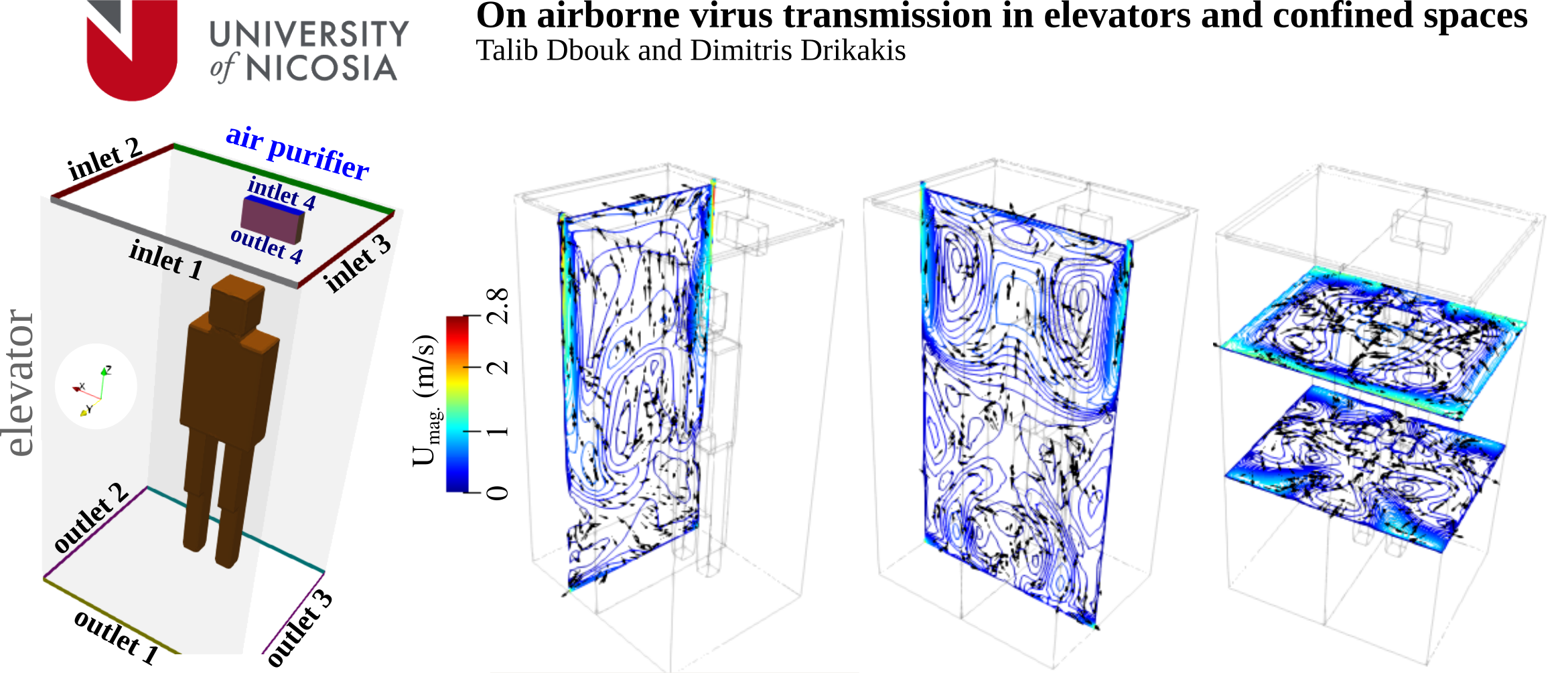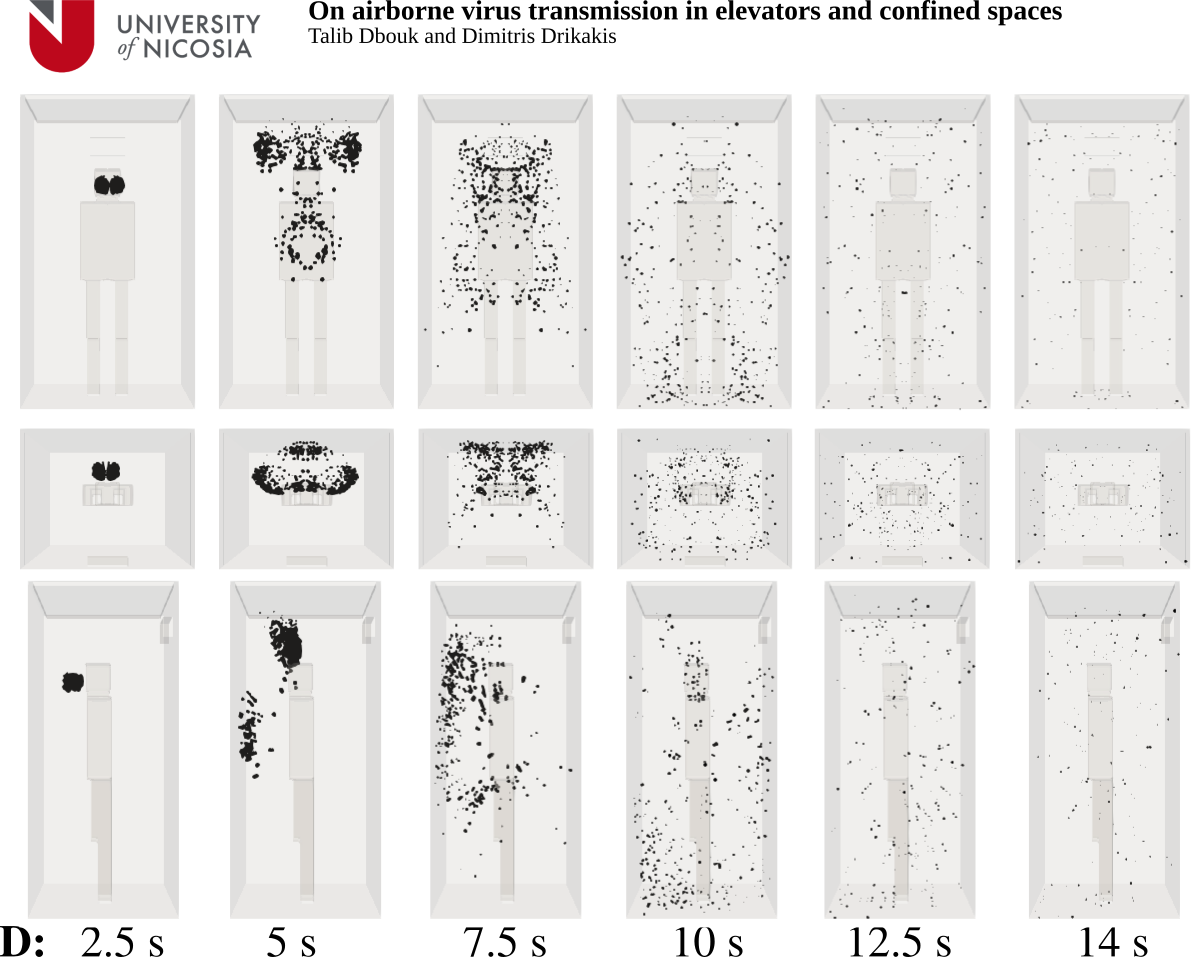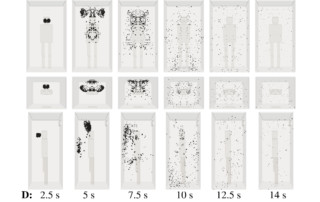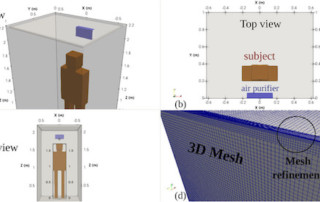COVID-19
UNIC Coronavirus Health and Research Portal
On Airborne Virus Transmission in Confined Spaces
Talib Dbouk and Dimitris Drikakis
University of Nicosia, Nicosia, Cyprus
The impact of air ventilation systems on airborne virus transmission, and aerosols in general, in confined spaces, is not yet understood.
The recent pandemic has made it crucial to understand the limitations of ventilation systems regarding virus transmission.
Let us consider an elevator as a prototypical example of a confined space and show how ventilation designs alone, regardless of cooling or heating, contribute to the airborne virus transmission.
In this study, we investigated air circulation effects inside an elevator by employing advanced multiphase computational fluid dynamics. We were interested in the performance of an air purifier installed in an elevator for reducing airborne virus transmission.
For the above reasons, we have investigated three different flow scenarios regarding the position and operation of inlets and outlets inside the elevator, and a fourth scenario that includes the operation of the air purifier.
Interestingly, we found that the position of the inlets and outlets significantly influences the flow circulation and droplet dispersion. More importantly, we found that an air purifier installed inside an elevator does not eliminate airborne virus transmission.
Figure 1
The geometry shows the different inlets and outlets (with 3 cm openings width) in an elevator. A subject is standing in the elevator’s cabin such that the subject’s mouth as a coughing source is positioned at x = 0 m, y= 0.41 m, z = 1.6 m. An air purifier (sanitizer) is also attached to the wall at about 1.9 m above the elevator’s cabin’s ground. The air purifier has an air intake (outlet 4) and air exhaust (inlet 4) for air circulation at ≈60 m3 /h. At the right sides (blue images with black arrows) is an example of air circulation for a specific scenario A showing the velocity magnitude at different planes. The environment is at 20 °C and 50% relative humidity. For this scenario D conditions, see Dbouk and Drikakis, Physics of Fluids, 33, 011905, (2021).
Figure 2
Local dispersion of contaminated saliva droplets inside an elevator’s cabin due to the presence of an air purifier. Top column: front view. Middle column: top view. Bottom column: side view. Contaminated saliva droplets are illustrated in black after being scaled by a factor of about 250 for their actual size. Subject position 2 corresponds to a person standing in the elevator’s cabin such that her/his mouth as a coughing source is positioned at x = 0 m, y = 0.675 m, z = 1.6 m. For this scenario D conditions, see Dbouk and Drikakis, Physics of Fluids, 33, 011905, (2021).
What Does This Mean?
In confined spaces such as an elevator, the placement of ventilation inlets and outlets significantly influences the flow circulation and droplet dispersion. Without an air purifier, the case of a single inlet and outlet exhibits the least droplet dispersion. The subject’s position inside the cabin also influences the flow circulation and droplet spread. The air purifier reduces the droplet dispersion but will not eliminate it. The air intake integrated inside the purifier equipment induces flow circulation that can add to the contaminated saliva droplets in the cabin. The time required for droplets reaching the elevator floor could be larger than the time necessary to deactivate the virus by other means such as UV radiation. Thus, the success of air purifiers lies in addressing the issue mentioned above. The present study’s results are pertinent to any confined spaces, including small rooms in residential or commercial facilities, car parks, shops, and an aircraft cabin, submarines, and spacecraft.
The broader implications of the present findings are that health and safety authorities must revise guidelines accordingly by considering the flow circulation and droplet dispersion effects from air purifiers and sanitizers in confined spaces. The design of future ventilation and purification systems should reduce airborne virus transmission through minimization of droplet dispersion.
Video 1
Contaminated saliva droplets dispersion inside an elevator’s cabin due to an operating air purifier: The air purifier induces local air circulations represented by the velocity contours isosurfaces. The contaminated saliva droplets are illustrated in black dots.
The University of Nicosia (UNIC)
About the University of Nicosia
The University of Nicosia (UNIC) is the largest university in Cyprus, and the largest university in southern Europe that teaches primarily in English, welcoming 12,000+ students from over 70 countries worldwide. The University of Nicosia is a comprehensive university with 6 schools, 20 departments and over 100 degree programs offered on-campus and online.
The University of Nicosia is best known in the fields of medicine, law, blockchain, accounting, education, forecasting and international relations and for a series of partnerships with other leading European universities. UNIC was most recently ranked #106 in its region by QS and #300 to #400 globally in the Times Higher Education Impact rankings.
To learn more about the University of Nicosia, please see: https://www.unic.ac.cy/
UNIC’s COVID-19 Response
University of Nicosia faculty across a variety of academic disciplines are actively engaged in research and analysis and serving in scientific / public policy roles supporting the global COVID-19 response.
For more information about the University of Nicosia’s work relating to COVID-19 including potential collaboration, please see: https://www.unic.ac.cy/coronavirus/
Contact Information
For more information about this study, please contact Prof Dimitris Drikakis at [email protected].
For more information on our COVID-19 related research in general, please contact UNIC at [email protected].
Press Coverage
Articles and press mentions in global media about the research.
In confined spaces, air purifiers may actually aid the spread of COVID-19
In confined spaces, air purifiers may actually aid the spread of COVID-19 "We quantified the effect of air circulation on airborne virus transmission and showed that installing an air purifier inside an elevator alters the air circulation significantly but does not eliminate airborne transmission," study co-author Dimitris Drikakis, researcher at the University of Nicosia in Cyprus, said in a news release. Read the full article here: In confined spaces, air purifiers may actually aid the spread of COVID-19
Air purifiers may do more harm than good in confined spaces, study finds
Air purifiers may do more harm than good in confined spaces, study finds While air purifiers could be expected to help reduce transmission, researchers from the University of Nicosia in Cyprus report that air purifiers in compact areas actually increase saliva droplet dispersal of airborne viruses. Read the full article here: Air purifiers may do more harm than good in confined spaces, study finds
Air purifiers can increase the spread of aerial virus infections in confined spaces
Air purifiers can increase the spread of aerial virus infections in confined spaces The position of the intake and exhaust ports in a limited space such as an elevator greatly affects virus infection in the air.To Fluid physicsAccording to AIP Publishing, researchers at the University of Nicosia in Cyprus have shown that while air purifiers are expected to help, they have the potential to actually increase their popularity. Read the full article here: Air purifiers can increase the spread of [...]
Air purifiers may do more harm than good in confined spaces with airborne viruses
Air purifiers may do more harm than good in confined spaces with airborne viruses A computation shows air purifiers in elevators and other confined spaces can actually increase saliva droplet dispersal, spreading COVID-19. The positions of air inlets and outlets in confined spaces, such as elevators, greatly affect airborne virus transmission. In Physics of Fluids, by AIP Publishing, researchers from University of Nicosia in Cyprus show while air purifiers would be expected to help, they may actually increase the spread. [...]
Air purifiers may do more harm than good in confined spaces with airborne viruses
Air purifiers may do more harm than good in confined spaces with airborne viruses The positions of air inlets and shops in confined spaces, equivalent to elevators, tremendously have an effect on airborne virus transmission. In Physics of Fluids, researchers from University of Nicosia in Cyprus present whereas air purifiers could be anticipated to assist, they may truly enhance the unfold. Read the full article here: Air purifiers may do more harm than good in confined spaces with airborne viruses
Air Purifiers May Do More Harm than Good
Air Purifiers May Do More Harm Than Good The positions of air inlets and outlets in confined spaces, such as elevators, greatly affect airborne virus transmission. While you would think air purifiers would help clean the air, they may actually increase the spread of airborne viruses, said researchers from University of Nicosia in Cyprus in a paper on the subject. Read the full article here: Air Purifiers May Do More Harm Than Good
Air purifiers may increase the spread of airborne virus transmission in confined spaces
Air purifiers may increase the spread of airborne virus transmission in confined spaces The positions of air inlets and outlets in confined spaces, such as elevators, greatly affect airborne virus transmission. In Physics of Fluids, by AIP Publishing, researchers from University of Nicosia in Cyprus show while air purifiers would be expected to help, they may actually increase the spread. Read the full article here: Air purifiers may increase the spread of airborne virus transmission in confined spaces
Coronavirus | Air purifiers may do more harm than good in confined spaces, study finds
Air purifiers may do more harm than good in confined spaces, study finds In the study, researchers conducted calculations for a 3D space equivalent to that of an elevator capable of holding five people.According to the study, a "mild cough" was simulated at one position in the elevator, and air inlets and outlets were added in various locations to look at the particles' influence on circulation. The study noted that an air purifier was also included in the simulation. Read [...]
Air purifiers can be harmful in the limited space where viruses in the air are present
Air purifiers can be harmful in the limited space where viruses in the air are present The position of the intake and exhaust ports in a limited space such as an elevator greatly affects virus infection in the air.To Fluid physicsResearchers at the University of Nicosia in Cyprus have shown that while air purifiers are expected to help, they have the potential to actually increase their popularity. Read the full article here: Air purifiers can be harmful in the limited [...]
Air purifiers may increase the spread of airborne virus transmission in confined spaces
The positions of air inlets and outlets in confined spaces, such as elevators, greatly affect airborne virus transmission. In Physics of Fluids, by AIP Publishing, researchers from University of Nicosia in Cyprus show while air purifiers would be expected to help, they may actually increase the spread. Air quality in small spaces can quickly degrade without ventilation. However, adding ventilation will increase the rate at which air, possibly laden with viruses, can circulate in the small space. Elevator manufacturers have [...]












